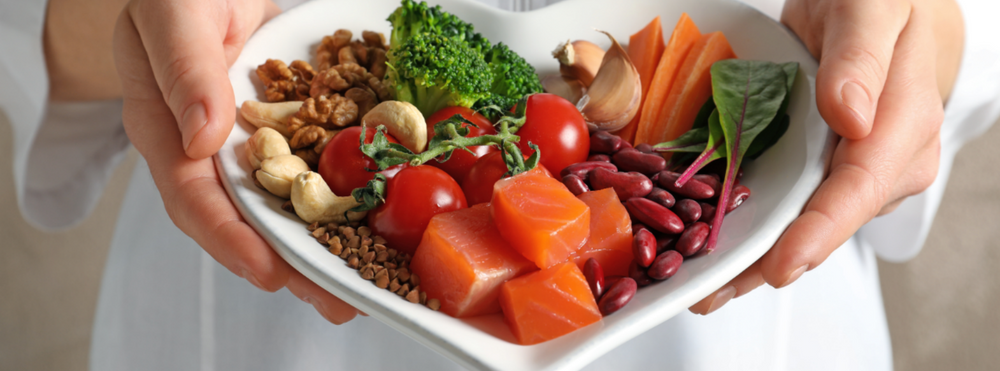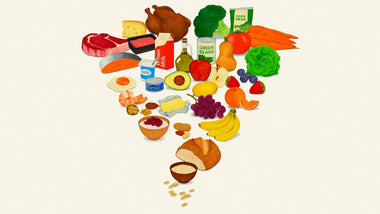What exactly is a heart-healthy diet?

When patients ask me what a heart-healthy diet is, I often repeat my favorite eight words of dietary advice from Michael Pollan: Eat real food, not too much, mostly plants.
I stick by that advice 100 percent. Notice that this approach does not emphasize one macronutrient over the others (so no “low carb” restrictions), is not based on deprivation (so you can still enjoy some meat and dairy), and allows for endless variety (so you never get bored). It truly is the most practical and sustainable dietary approach ever. Period.
However, I know some of you are hungry for more details. So here we go:
For meat, your total intake should stay below 1 lb per week from lean cuts of chicken, beef, pork and lamb. NONE of that amount should come from bacon, sausages or hamburgers, which should be avoided altogether. One pound of lean meat delivers about 70 grams of protein, which is about a day’s worth for a man of average height and almost 2 days worth for an average woman. This means you will need to get the rest of your protein for the rest of your week’s needs from other sources. This is where beans, nuts, seeds, fish, eggs, and dairy come in. Eat those in reasonable amounts (one egg per day or less, don’t go crazy with the cheese, etc.) and you’ll be golden for protein intake while still adhering to a whole food, primarily plant-based diet. Truth be told, you don’t really need to worry much about protein – it’s a pretty ubiquitous nutrient, even found in all plants. Remember - monkeys and gorillas are vegetarians. Cows and horses are vegan.
For carbohydrates, don’t focus on whether it’s a carb. Rather focus on whether it’s a health-promoting carb. Carbs encompass everything from a sugar cube to a head of broccoli. Our bodies don’t need the sugar cube. But they sure need the broccoli! The best way to determine the relative health value of the carb you’re consuming is to look at the natural fiber content (fiber supplemented foods don’t count!).
Dietary fiber, ironically, is the part of plant foods your body can't digest or absorb, but it helps reduce blood pressure, inflammation, and bad cholesterol. It also regulates blood sugar, which can help promote weight loss. Fiber-rich foods tend to be filling: Think of how much more satiating a high-fiber apple is compared to a few jelly beans. Oats, nuts, and beans are not only rich protein sources, but they're also great sources of fiber. Ideally, you want to get to at least 30 g of fiber per day and you can get there with some simple substitutions (by the way, 2 servings of Step One supply at least 10 g):

|
For fats, favor those that are liquid at room temperature. That includes olive oil, the oils in nuts and seeds, the oils in avocados, and fish. For higher heat cooking, use avocado or grapeseed oil which have higher burning points. For the occasional times, you need very high heat, coconut oil is a good option.
So, what do I eat?
I wish I could proudly announce that my diet is pristine. But the truth is that I am NOT perfect. I may be a cardiologist and live this stuff every day, but I will still eat a piece of pizza or have a burger with fries. However, I have markedly reduced the number of times I do that – because as I've moved to a more whole-food plant-based diet in general, I've noticed how much worse my body feels after eating those "cheat" items. Which makes it so much easier to get back on track. Ultimately, eating for heart health is sustainable because people feel better eating this way - regardless of their cholesterol levels or degree of weight loss.
So - on most days, my intake looks something like this: Step One Foods Oatmeal or Sprinkle for breakfast, a piece of fruit or handful of almonds for a mid-morning snack, a bowl of farro with olives, feta, tomatoes, and pine nuts for lunch, a Dark Chocolate Crunch Bar in the afternoon, and salmon with zucchini and peppers for dinner.
You might look at that list and say I’m following the Mediterranean diet. And that might be the closest pattern to what I actually consume. But I don’t believe in diets or scripted eating plans. I believe we know how to eat for health instinctively. We just need to listen to our instincts more! After all, every other animal on the planet knows what to eat! Which is healthier: a bowl of chips or a bowl of berries? The answer is obvious. And when you make what you know to be the better choice on a regular basis, you put yourself on the road to a sustainable meal plan that’s healthy for your heart. Even if you’re not perfect 100% of the time.

Tested & Proven Results.
- Cardiologist formulated
- Supported by over 500 publications
- Clinically-proven, in a double-blind randomized trial with Mayo Clinic and The University of Manitoba
80% of participants lowered their cholesterol in just 30 days. With just two servings per day, Step One Foods offers a proven-effective way to naturally lower LDL (bad) cholesterol.
Get heart health tips and articles like this, delivered right to your email.
New articles every week.
You may also like...

The New Food Pyramid: What It Gets Right (and What It Misses)

Why Most New Year’s Resolutions Fail - And How to Right-Size Yours

You don’t need to avoid foods with cholesterol…except for these



